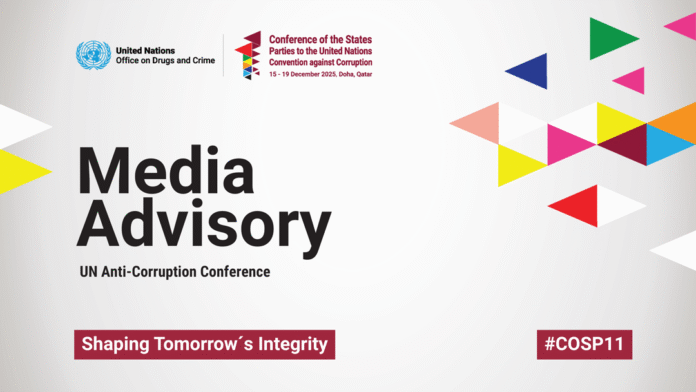Overview of the UN Anti-Corruption Conference
The UN Anti-Corruption Conference stands as a pivotal platform for nations to come together in the effort to combat corruption on a global scale. Established under the United Nations Convention Against Corruption (UNCAC), this conference serves as the largest international forum focused on addressing corruption and promoting integrity in governance. The biennial event draws representatives from member states, civil society, the private sector, and international organizations, fostering a collaborative environment aimed at eradicating corrupt practices worldwide.
The history of the UN Anti-Corruption Conference dates back to the adoption of the UNCAC in 2003, a landmark treaty that set a framework for countries to develop and implement anti-corruption measures. The Conference of the States Parties (COSP), held every two years, acts as the governing body of the UNCAC, discussing implementation challenges and strategies, sharing best practices, and reviewing progress made by participating countries. Each session features discussions on various themes related to corruption, leading to the issuance of resolutions that guide future action and reinforce commitment to integrity.
The objectives of the UN Anti-Corruption Conference are multifaceted. Primarily, it seeks to enhance the capacity of countries to prevent and combat corruption through the exchange of experiences and resources. Furthermore, the conference aims to facilitate engaging dialogue and collaboration among a diverse array of stakeholders including government officials, civil society representatives, and private sector leaders. This interaction is vital as it encourages comprehensive approaches to tackle the complexities of corruption, fostering partnerships that extend beyond borders. Ultimately, the conference’s role as a policymaking body under UNCAC is crucial in steering global anti-corruption initiatives and inspiring collective action towards a corruption-free environment.
COSP11: Key Themes and Focus Areas
The Eleventh Session of the Conference of the States Parties to the United Nations Convention against Corruption (COSP11) is poised to address critical issues under the overarching theme of ‘Shaping Tomorrow’s Integrity.’ This theme underscores the necessity of evolving anti-corruption strategies to meet contemporary challenges. One of the primary focus areas is the integration of technology into these strategies, which acknowledges the dual role of technology as both a facilitator of corruption and a tool for combating it. Technologies such as blockchain and artificial intelligence are gaining traction in ensuring transparency, enhancing accountability, and identifying corrupt practices in real time. The discussions at COSP11 are expected to explore innovative technological solutions aimed at reducing corruption risks across various sectors.
Another significant theme at the conference is the intersection of corruption with organized crime. The lines between these two domains are increasingly blurred, as corrupt practices often enable criminal activities ranging from drug trafficking to human smuggling. COSP11 aims to delve deeper into how corruption acts as a catalyst for organized crime and, conversely, how criminal networks exploit corruption to further their agendas. Addressing this intersection requires a multidimensional approach, which includes understanding the dynamics of both corruption and crime and developing policies that mitigate these risks effectively.
Lastly, the importance of international partnerships in combating corruption will be a focal point of discussion at COSP11. The complexity of corruption transcends national borders, which necessitates collaborative efforts among countries, international organizations, and civil society. Emphasizing cooperation and shared strategies, the conference aims to foster dialogue and exchange best practices that bolster collective action against corruption. The outcomes of these discussions could pave the way for comprehensive, globally-coordinated initiatives that enhance integrity and promote accountability on an international scale.
Anticipated Attendance and Contributions
The Eleventh Session of the United Nations Anti-Corruption Conference, often referred to as COSP11, is poised to attract a diverse assembly of participants from various sectors. Expectations indicate that more than 2,000 stakeholders, ranging from government officials to representatives from international organizations, civil society, and the private sector, will be present. This impressive turnout underscores the global commitment to combating corruption and highlights the conference’s significance as a premier platform for dialogue and action.
Among the expected participants are high-level officials, who are integral to fostering discussions on anti-corruption strategies and implementing effective policies. Their contributions will not only shape the agenda but also provide insights into best practices and innovative approaches to tackling corruption in different contexts. The presence of diverse stakeholders will enrich the discussions, allowing for the exchange of ideas that could lead to practical solutions tailored to specific challenges encountered by nations worldwide.
Furthermore, the conference serves as a critical opportunity for networking and collaboration among participants. Engaging with peers from various sectors opens avenues for forming strategic partnerships, which can amplify the impact of anti-corruption initiatives. Conversations that take place during the event may lead to joint projects, sharing of resources, and collective advocacy efforts that reinforce the anti-corruption agenda on a broader scale.
Ultimately, the anticipated attendance and active participation at COSP11 underscore the collaborative spirit necessary for advancing the fight against corruption. By bringing together a wide array of stakeholders, the conference aims to create an environment conducive to meaningful discussions that inspire action and foster commitment to integrity, transparency, and accountability.
Protecting Journalists and Whistleblowers: A Focus on Integrity
The upcoming Eleventh Session of the UN Anti-Corruption Conference in Doha presents a pivotal opportunity to address the essential roles played by journalists and whistleblowers in combating corruption. These individuals often serve as the first line of defense against corruption, meticulously uncovering wrongdoing and exposing fraudulent practices. Their courageous efforts are critical not only for fostering transparency but also for enhancing societal accountability.
Investigative journalism hinges on the ability to reveal the truth, especially in environments where corruption thrives. Journalists, by exposing corrupt practices, create public awareness, prompting societal demand for change and accountability. Likewise, whistleblowers, often employees aware of corrupt actions within their organizations, face significant risks when deciding to report misconduct. The importance of protecting these individuals cannot be overstated, as their safety and job security are frequently jeopardized by their commitment to integrity.
Recognizing these risks, the UN Anti-Corruption Conference aims to introduce specific measures designed to safeguard the rights and welfare of journalists and whistleblowers. These measures could include stronger legal protections, providing confidential reporting channels and establishing support systems that shield them from retaliatory actions, which are often severe. Moreover, fostering a culture that values and protects these roles is integral to promoting accountability in governance and corporate practices. It is crucial that the proposed enhancements in the UN Convention serve to empower both journalists and whistleblowers, ensuring they can operate without fear, thus encouraging an environment rich in integrity.
The measures discussed at COSP11 signify a pivotal step towards creating a safer landscape for these vital players in the fight against corruption. Protecting journalists and whistleblowers is not only about safeguarding the individuals themselves but also about nurturing the public’s right to know by enhancing the mechanisms that promote transparency and integrity in governance.


